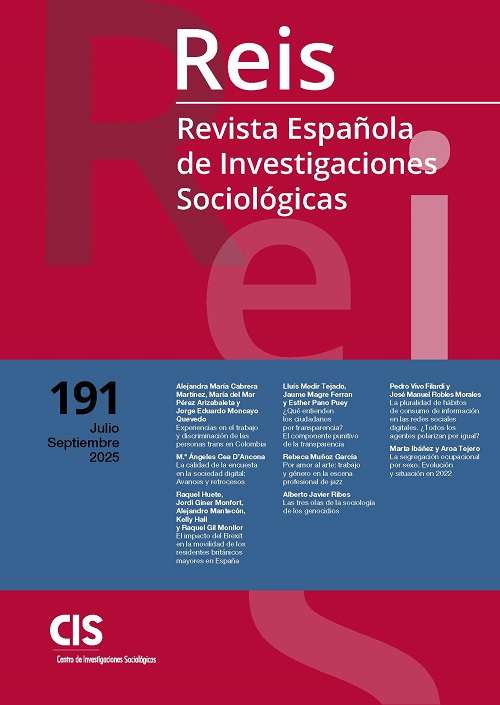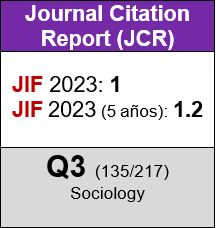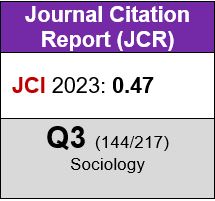Las tres olas de la sociología de los genocidios
DOI:
https://doi.org/10.5477/cis/reis.191.97-112Palabras clave:
genocidio, teoría social, teoría sociológica, violencias colectivas, ViolenciaResumen
El objetivo de este artículo es presentar una imagen panorámica de la sociología de los genocidios, desde sus orígenes hasta el presente. La tesis fundamental que se defiende es que la sociología de los genocidios estaría alcanzando, hoy en día, un nivel de maduración que la convierte en una subdisciplina cada vez más pujante y ya bien asentada. La combinación del paradigma de la obediencia con el paradigma del permiso parece una opción prometedora para futuras investigaciones. Asumir que existen dos conceptos de genocidio, el concepto jurídico de genocidio y el concepto sociológico de genocidio, permite ensanchar los casos a considerar e incluir de una manera muy principal a los casos de violencias políticas y los casos coloniales.
Descargas
Citas
Arendt, Hannah (2015) [1963]. Eichmann en Jerusalén. Barcelona: Random House.
Arendt, Hannah (2015) [1969]. Sobre la violencia. Madrid: Alianza Editorial.
Asch, Solomon E. (1955). «Opinions and Social Pressure». Scientific American 193(5): 31–5.
Bauman, Zygmunt (2010) [1989]. Modernidad y Holocausto. Madrid: Sequitur.
Bloxham, Donald y Moses, Dirk A. (eds.) (2010). The Oxford Handbook of Genocide Studies. Oxford: Oxford University Press.
Browning, Chistopher R. (2001) [1992]. Ordinary Men: Reserve Police Battalion 101 and the Final Solution in Poland. London: Penguin Books.
Bruneteau, Bernard (2009) [2004]. El siglo de los genocidios. Madrid: Alianza Editorial.
Chalk, Frank y Jonassohn, Kurt (1990). The History and Sociology of Genocide. Analysis and Case Studies. New Haven: Yale University Press.
Dadrian, Vahakn N. (1975). «A Typology of Genocide». International Review of Modern Sociology, 5(2): 201-12.
Davis, Mike (2001). Late Victorian Holocausts: El Niño Famines and the Making of the Third World. London: Verso.
Docker, John (2015). «A Plethora of Intentions: Genocide, Settler Colonialism and Historical Consciousness in Australian and Britain». International Journal of Human Rights, 19 (1): 74-89. doi: 10.1080/13642987.2014.987952
Du Bois, William E. B. (1907). The economic revolution in the South. En: B. T. Washington y W. E. B. Du Bois. The Negro in the South: his economic progress in relation to his moral and religious development. Philadelphia: George W. Jacobs & Company Publishers.
Du Bois, William E. B. (1920). Darkwater. Voices from within the veil. New York: Harcourt, Brace and Company.
Fein, Helen (1990). «Defining Genocide as a Sociological Concept». Current Sociology, 38(1): 8-31. doi: 10.1177/001139290038001004
Finkel, Evgeny y Strauss, Scott (2012). «Macro, Meso and Micro Research on Genocide: Gains, Shortcomings, and Future Areas of Inquiry». Genocide Studies and Prevention: An International Journal, 7(1), Article 7: 56-67. Disponible en: https://digitalcommons.usf.edu/gsp/vol7/iss1/7, acceso 22 de febrero 2024.
Gerlach, Christian (2010). Extremely violent societies. Mass violence in the Twentieth-Century World. Cambridge: Cambridge University Press.
Hilberg, Raul (1961). The destruction of the european jews. London: W. H. Allen.
Hinton, Alexander L. (ed.) (2002). Annihilating Difference: The Anthropolgy of Genocide. Berkeley, CA: University of California Press.
Horkheimer, Max y Adorno, Theodor (2006) [1944]. Dialéctica de la Ilustración. Madrid: Trotta.
Kelman, Herbert G. (1973). «Violence without Moral Restraint: Reflection on Dehumanization of Victims and Victimizers». Journal of Social Issues, 29(4): 25–61. doi: 10.1111/j.1540-4560.1973.tb00102.x
Kertész, Imre (2018) [1975]. Sin destino. Madrid: Acantilado.
Kuhn, Thomas S. (1970) [1962]. The Structure of Scientific Revolutions. Chicago, IL: University of Chicago Press.
Kuper, Leo (1982). Genocide. Its Political Use in the Twentieth Century. New Haven: Yale University Press.
Lemkin, Raphael (1933). Les actes constituant un danger general (interétatique) consideres comme delits des droits des gens. Paris: A. Pedone.
Lemkin, Raphael (1944). Axis Rule in Occupied Europe: Laws of Occupation, Analysis of Government, Proposal of Redress. Washington: Carneggie Endowment for International Peace. Chapter IX.
Levene, Mark (2008) [2005]. The Meaning of Genocide: Genocide in the Age of the Nation State. London: I.B. Tauris.
Luft, Aliza (2015). «Toward a Dynamic Theory of Action at the Micro-level of Genocide: Killing, Desistance and Saving in 1994 Rwanda». Sociological Theory, 33(2): 148-72. doi: 10.1177/0735275115587721
Madley, Benjamin (2004). «Patterns of Frontier Genocide 1803–1910: The Aboriginal Tasmanians, the Yuki of California, and the Herero of Namibia». Journal of Genocide Research, 6(2): 167-92. doi: 10.1080/1462352042000225930
Madley, Benjamin (2008). «California’s Yuki Indians: Defining Genocide in Native American History» Western Historical Quarterly, 39: 303-32. doi: 10.1093/whq/39.3.303
Malesevic, Sinisa (2013). «Forms of Brutality: Towards a Historical Sociology of Violence». European Journal of Social Theory, 16(3): 273-91. doi: https://doi.org/10.1177/1368431013476524
Mann, Michael (2005). The Dark Side of Democracy: Explaining Ethnic Cleansing. Cambridge: Cambridge University Press.
Martineau, Harriet (1837). Society in America, vol. I. New York: Saunders and Outley.
Marx, Karl (2000) [1867]. El Capital. Crítica de la Economía Política. Volumen I. México: Fondo de Cultura Económica.
Milgram, Stanley (2004) [1975]. Obedience to Authority. New York: Harper Collins.
Moses, Dirk A. (2021). The problems of genocide. Permanent security and the language of trasngression. Cambridge: Cambridge University Press.
Moshman, David (2007). «Us and Them: Identity and Genocide». Identity: an international Journal of Theory and Research, 7(2): 115-35. doi: 10.1080/15283480701326034
Organización de las Naciones Unidas (1946). Resolución 96. Disponible en: https://documents.un.org/doc/resolution/gen/nr0/033/47/img/nr003347.pdf?OpenElement, acceso 22 de febrero 2024.
Organización de las Naciones Unidas (1948). Convención para la prevención y sanción del delito de genocidio. Disponible en: https://www.ohchr.org/es/instruments-mechanisms/instruments/convention-prevention-and-punishment-crime-genocide, acceso 22 de febrero 2024.
Owens, Peter B.; Su, Yang y Snow, David A. (2013). «Social Scientific Inquiry into Genocide and Mass Killing: From Unitary Outcome to Complex Processes». Annual Review of Sociology, 39: 69-84. doi: 10.1146/annurev-soc-071312-145650
Ribes, Alberto J. (2019). «Teoría de la violencia exterminista: sobre la centralidad de la violencia física legitimada». Revista Española de Investigaciones Sociológicas, 167: 218-243. doi: 10.21501/22161201.4094
Ribes, Alberto J. (2021). «Permission, obedience, and continuities: a contribution to the sociological theory of genocidal processes». Journal of Sociology, 57 (3): 631-646. doi: 10.1177/1440783320940404
Sartre, Jean-Paul (1968). «On Genocide». Ramparts February, pp. 36-42.
Savon, Herve (1972). Du cannibalisme au génocide. Paris: Hachette.
Scheper-Hughes, Nancy (2002). Coming to Our Senses. Anthropology and Genocide. En: AL. Hinton (ed). Annihilating Difference. The Anthropolgy of Genocide (pp. 348-381). Berkeley, CA: University of California, Press.
Semelin, Jacques (2005). Purifier et détruire: Usages politiques des massacres et génocides. Paris: Éditions du Seuil.
Shaw, Martin (2015). What is Genocide? Cambridge: Polity Press.
Strauss, Scott (2007). «Second-generation Comparative Research on Genocide». World Politics 59(3): 476-501. doi: 10.1353/wp.2007.0030
Strauss, Scott (2012). «Destroy Them to Save Us: Theories of Genocides and the Logics of Political Violence». Terrorism and Political Violence, 24(4): 544-560. doi: 10.1080/09546553.2012.700611
Tocqueville, Alexis de (2006) [1835]. La democracia en América, vol. I. Madrid: Alianza.
Wiesel, Elie (2008). The Night Trilogy. Night. Dawn. Day. New York: Hill and Wang.
Wolff, Kurt H. (1969). «For a Sociology of Evil». Journal of Social Issues, 25(1): 111-125. doi: 10.1111/j.1540-4560.1969.tb02581.x
Woolford, Andrew (2009). «Ontological Destruction: Genocide and Canadian Aboriginal People». Genocide Studies and Prevention, 4(1): 81-97. Disponible en: : https://digitalcommons.usf.edu/gsp/vol4/iss1/6, acceso: 22 de febrero 2024.
Zimbardo, Philip G. (1971). «The Power and Pathology of Imprisonment». Congressional Record, 15: 10-25.
Descargas
Publicado
Cómo citar
Número
Sección
Licencia
Derechos de autor 2024 Revista Española de Investigaciones Sociológicas

Esta obra está bajo una licencia internacional Creative Commons Atribución-CompartirIgual 4.0.
Permite Compartir — copiar y redistribuir el material en cualquier medio o formato, Adaptar — remezclar, transformar y construir a partir del material para cualquier propósito, incluso comercialmente.








